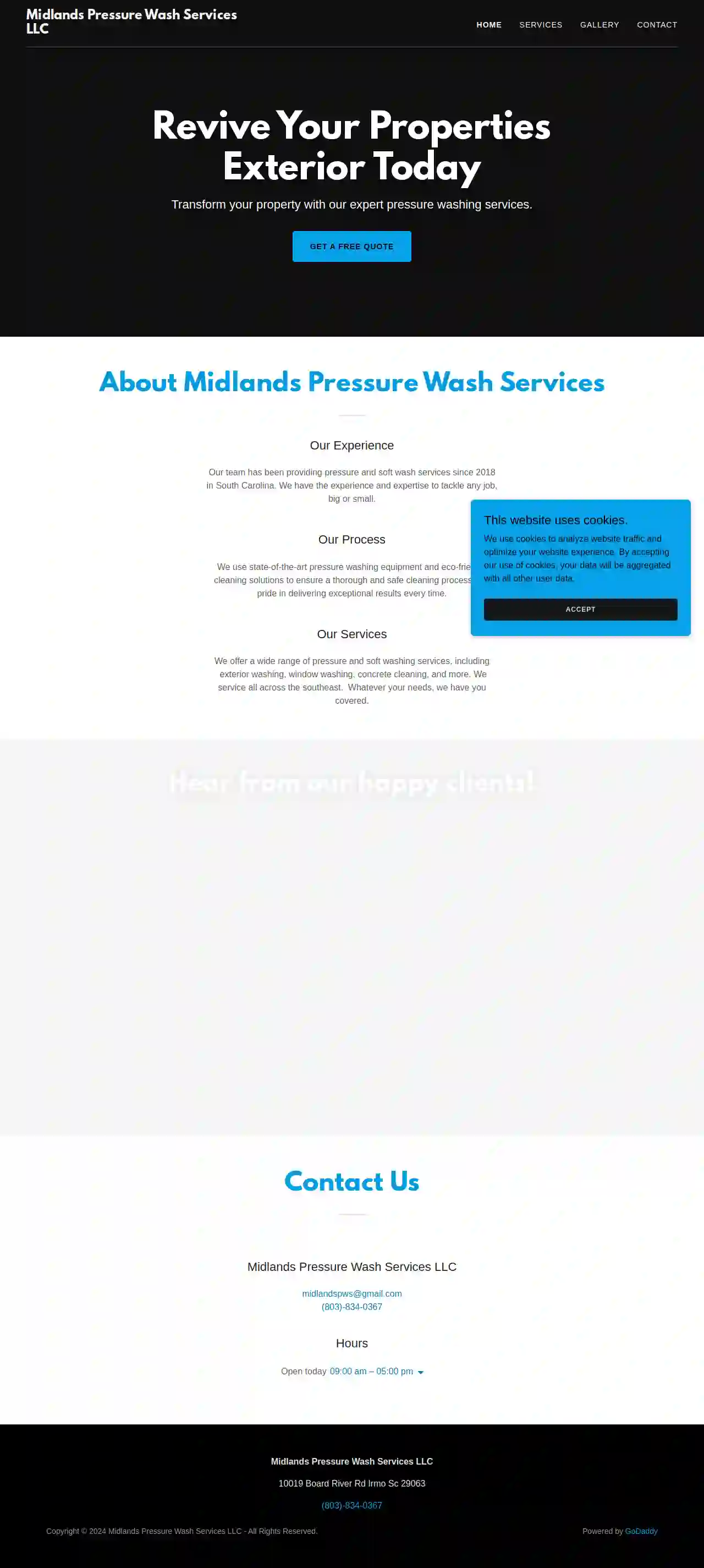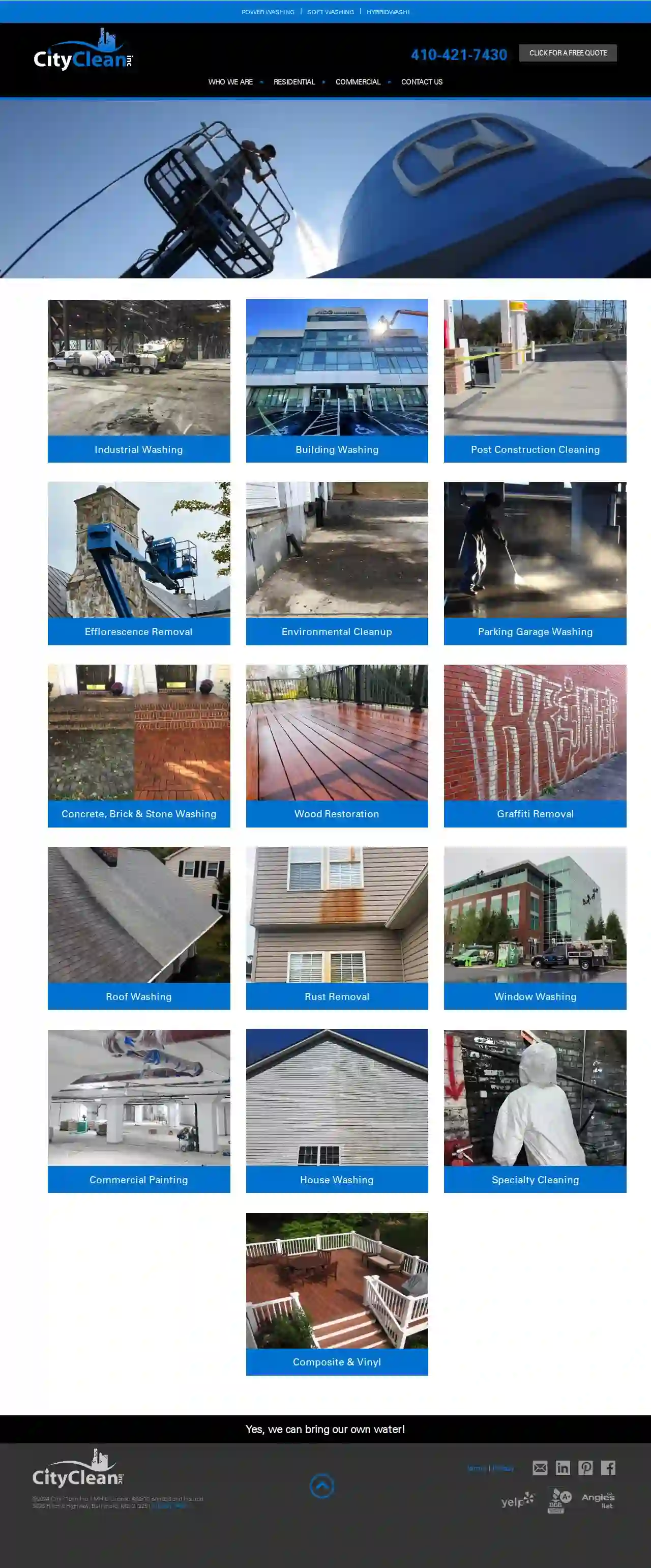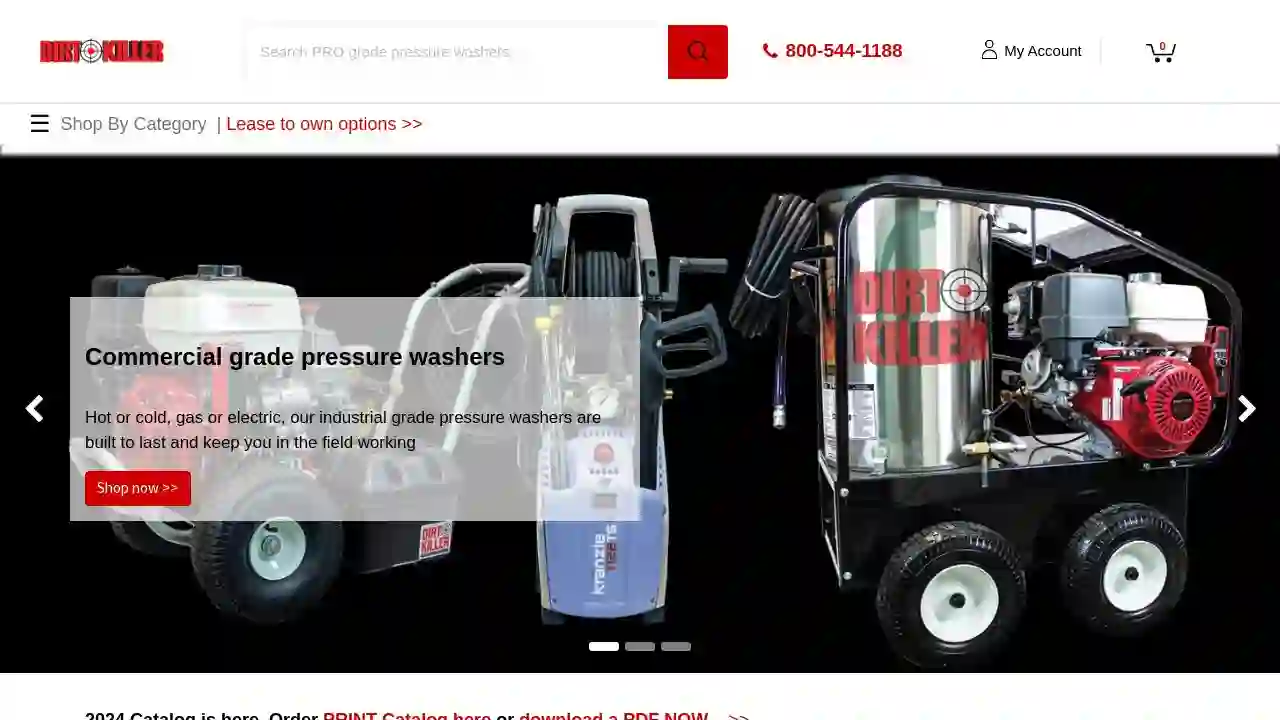Pressure Washing Pleasant Hills
Find top Pressure Washing in Pleasant Hills
Receive 3 FREE Deck and Fence Cleaning quotes for your project today! Compare profiles, reviews, accreditations, portfolio, etc... and choose the best service.

Grease Eaters Power Washing
539 reviewsEssex, MD, 21221, USWe Don't Leave Until You're Clean! Schedule Your Free Exterior Cleaning Estimate Today! At Grease-Eaters Power Washing, we're committed to providing excellent service at an affordable price. We offer a full range of pressure washing solutions for residential and commercial buildings in and around Baltimore. Our team of experienced pressure washers can provide you with a free estimate, so reach out to us today! We're proud to be the best in the business when it comes to providing extensive cleaning services. Your home or business will be free of mold, algae, stubborn dirt, and oil stains. We offer a wide range of maintenance for your Baltimore home or business, from graffiti removal to storefront washing to house washing to driveway washing.
- Services
- Why Us?
- Accreditations
- Our Team
- Testimonials
- Gallery
Get Quote
Soda City Pressure Wash
552 reviewsColumbia, 29209-1411, USSoda City Pressure Wash, LLC is a locally-owned and operated pressure washing company serving the Columbia, SC area. We are dedicated to providing unbeatable cleaning at a great price, saving our customers time, cash, and energy. Our team of experts combines hi-tech equipment, industry experience, and a keen eye for detail to deliver exceptional results. We understand that pressure washing is more than just using equipment; it's about paying attention to the unique needs of each surface. Whether it's driveway washing, roof cleaning, or deck and fence washing, we take pride in delivering superior results that keep our customers coming back year after year. We are passionate about keeping Columbia beautiful, one home at a time. Our commitment to quality service is rooted in our deep pride for our region and its stunning natural beauty. We believe that pressure washing is an essential part of maintaining a healthy and happy home, and we strive to make the process as stress-free as possible for our customers.
- Services
- Why Us?
- Gallery
Get Quote
Midlands Pressure Wash Services LLC
520 reviews10019 Broad River Road, Irmo, 29063, USTransform your property with our expert pressure washing services. Our team has been providing pressure and soft wash services since 2018 in South Carolina. We have the experience and expertise to tackle any job, big or small. We use state-of-the-art pressure washing equipment and eco-friendly cleaning solutions to ensure a thorough and safe cleaning process. We pride in delivering exceptional results every time. We offer a wide range of pressure and soft washing services, including exterior washing, window washing, concrete cleaning, and more. We service all across the southeast. Whatever your needs, we have you covered.
- Services
- Why Us?
- Accreditations
- Our Team
- Testimonials
- Gallery
Get Quote
City Clean Inc - Pressure Washing & Soft Washing
5163 reviews5828 Ritchie Highway, Baltimore, 21225, USWith more than 25 years of experience and over 900 A+ online reviews, City Clean has quickly become central Maryland’s highest rated and most trusted soft washing and power washing company. City Clean is a company that strives for excellence in its daily operations and prides itself in providing high quality services in a timely, consistent, efficient, and cost effective manner. Continual maintenance of these high standards, has allowed us to cultivate a loyal, satisfied customer base and the best employees. We stay ahead of our competition by keeping up with the latest cutting edge technology that helps us address our clients’ needs, as well as maintain a safe work environment. With countless hours spent researching new techniques, attending industry seminars, and networking, City Clean guarantees to not just meet your needs, but to exceed your expectations. Our residential customers love us because we know what it takes to properly and safely maintain the exterior of their home. Over time we have developed our own special HybridWash!™ System that allow us to consistently produce superior and lasting results all while using 100% bio-degradable, environmentally friendly and safe detergents. Our commercial clients praise us for having the skill and experience to get difficult and time sensitive jobs completed accurately and efficiently when nobody else can.
- Services
- Why Us?
- Accreditations
- Gallery
Get Quote
Mid-Atlantic Power Washing, Inc
4.879 reviews26 Lee St., Annapolis, 21401, USMid-Atlantic Power Washing is a top-rated power washing company serving Maryland and the Mid-Atlantic area. We are proud to offer a wide range of services, including home power washing, commercial power washing, and marine power washing. Our team of experienced professionals is dedicated to providing our customers with the highest quality service at competitive prices. We are fully insured and licensed, and we stand behind our work 100%.
- Services
- Why Us?
- Our Team
- Testimonials
- Gallery
Get Quote
Estrada services
51 reviewsGermantown, MD, 20874, USWelcome to Estrada Services LLC, a local pressure washing business serving private clients in Germantown, MD. We offer a wide range of services, including pressure washing, soft washing, gutter cleaning, roof cleaning, home cleaning, interior & exterior painting, and window washing. Our team is licensed, certified, insured, bonded, and working at competitive rates. We have been serving the local community since 2010, delivering solutions that epitomize all prerequisites. We can do everything from walkways, driveways, parking lots, patios, decks, concrete features, building exteriors, or any other outdoor feature or area. Our goal is to ensure your complete satisfaction and provide impeccable results regardless of the nature of the tasks at hand.
- Services
- Why Us?
- Our Team
- Testimonials
- Gallery
Get Quote
Absolute Power Washing LLC
519 reviewsRockville, 20850, USABSOLUTE POWER WASHING LLC in Rockville, the expert power washing company. We offer a variety of services including pressure washing, power washing, soft wash, deck repair, maintenance and staining. CLICK HERE FOR FREE ESTIMATES We are a local family owned and operated company located in Rockville, MD. We take our time and strive for perfection on every job. We have more than 10 years of experience in the industry and are knowledgeable on some of the best methods and techniques to use when pressure washing, like using a soft wash method, roof cleaning, and specific cleaning solutions to use on each surface. When you choose us you can be confident that we will perform each job with care. Customer Satisfaction Guaranteed. We are only done with the job when YOU are satisfied. Our number one goal is to WOW you with the results. Absolute Power Washing guarantees your satisfaction! We service Montgomery County, MD (Rockville, Bethesda, Potomac, Gaithersburg, Silver Spring) and surrounding counties too, just ask!
- Services
- Why Us?
- Testimonials
- Gallery
Get Quote
Power Wash Company Pressure Washing Services
Beverly Hills, FL, 1020 W Buttonbush Drive, 34465, USPowerWashCompany.com is a professional power washing service provider with offices in Gaithersburg, MD, Williamsport, MD, Germantown, MD, Beverly Hills, FL, and Greensboro, NC. We offer a wide range of services including residential, commercial, government, and industrial power washing. Our team of experts uses eco-friendly cleaning solutions and low-pressure cleaning methods to ensure a safe and effective cleaning experience. With over 30 years of experience in graffiti removal, we are a trusted partner for property owners and managers. Our services include brick cleaning, concrete cleaning, dumpster pad cleaning, graffiti removal, parking garage cleaning, rust removal, and warehouse cleaning. We also offer gutter cleaning and gutter guard installations. Our team is fully trained and certified to ensure that your property is cleaned correctly and safely. We pride ourselves on our reliable on-time service, better quality, and a better price. Contact us today to get a free estimate and learn more about our services.
- Services
- Why Us?
- Accreditations
- Our Team
- Gallery
Get Quote
Dirt Killer pressure washers
56 reviewsLinthicum Heights, MD, 823 North Hammonds Ferry Rd Suite B-C, 21090, USDirt Killer Pressure Washers Inc. is a leading manufacturer of gas powered pressure washers with Kränzle pumps and Honda engines. They also import Kränzle electric pressure washers and accessory products. Additionally, they manufacture premium cleaning soaps and detergents for house washing, exterior cleaning, and car detailing.
- Services
- Why Us?
- Accreditations
- Our Team
- Testimonials
- Gallery
Get Quote
MEGAH SoftWash of Baltimore
511 reviews123 Main St, Baltimore, MD, 21201, USMEGAH SoftWash is a soft washing, low-pressure washing and exterior cleaning company based in Baltimore, MD. They offer a range of services including house washing, driveway cleaning, walkways, siding, windows, gutters, roof cleaning, and more. The company prides itself on being the highest rated and reviewed exterior cleaning company in Baltimore, offering fast and easy scheduling, and providing customers with three different packages to choose from.
- Services
- Why Us?
- Accreditations
- Our Team
- Testimonials
- Gallery
Get Quote
Over 60,241+ Cleaning Services on our platform
Our janitorial service providers operate in Pleasant Hills & surrounding areas!
CleaningMatch has curated and vetted Top Janitorial Services in Pleasant Hills. Find a top & reliable contractor today.
Frequently Asked Questions About Pressure Washing
- Experience: 'How long have you been in business, and what types of pressure washing projects do you specialize in?'
- Licensing and Insurance: 'Are you licensed, insured, and bonded? Can I see proof of coverage?'
- Equipment and Techniques: 'What type of pressure washer do you use? What cleaning solutions do you use, and are they safe for my surfaces?'
- Safety Precautions: 'What safety precautions do you take during pressure washing?'
- Surface Preparation: 'Will you need to move any furniture or objects before pressure washing?'
- Water Usage: 'Do you use a water reclamation system or other methods to conserve water?'
- Cleanup: 'How do you handle cleanup after pressure washing?'
- Guarantees: 'Do you offer a satisfaction guarantee?'
- References: 'Can you provide references from previous clients?'
- Reputation and Reviews: Check online reviews and ask for referrals to gauge the company's reputation and customer satisfaction.
- Experience and Expertise: Look for a company with a proven track record and experience in pressure washing various surfaces.
- Licensing and Insurance: Ensure the company is licensed and insured to protect you from liability.
- Equipment and Techniques: Inquire about the company's equipment and techniques to ensure they use appropriate pressure levels and cleaning solutions.
- Quotes and Pricing: Obtain detailed quotes that outline all services and costs.
- Professionalism and Communication: Choose a company that is responsive, communicative, and professional.
- Electric Pressure Washers: Suitable for light-duty cleaning tasks like washing cars, patios, or fences. They are less powerful than gas pressure washers but are generally more affordable and easier to operate.
- Gas Pressure Washers: More powerful than electric pressure washers, making them suitable for heavier cleaning tasks like removing stubborn stains, cleaning driveways, or stripping paint.
- PSI and GPM: Consider the PSI (Pounds per Square Inch) and GPM (Gallons per Minute) ratings. Higher PSI and GPM indicate a more powerful pressure washer. For most home cleaning tasks, a pressure washer with a PSI of 2000-3000 and a GPM of 2-3 is sufficient.
- Spring and Fall: Spring and fall are often ideal for pressure washing as the temperatures are moderate and the weather is typically dry.
- Summer: Pressure washing can be done in the summer, but avoid doing so during the hottest part of the day to prevent the cleaning solutions from drying too quickly and leaving streaks.
- Winter: Pressure washing is possible in the winter, but be mindful of freezing temperatures that can affect cleaning solutions and cause slippery surfaces.
What questions should I ask a pressure washing contractor before hiring them?
By asking these questions, you can gather valuable information and choose a pressure washing contractor that meets your requirements.
What should I look for in a pressure washing company?
A reputable pressure washing company will prioritize safety, use appropriate cleaning methods, and provide excellent customer service.
What type of pressure washer do I need for my home?
If you're unsure about the type of pressure washer best suited for your needs, consult with a pressure washing professional or a home improvement specialist.
What is the best time of year for pressure washing?
Choose a day with mild temperatures and dry weather for optimal pressure washing results. Avoid pressure washing in extreme heat, freezing temperatures, or rainy conditions.
What questions should I ask a pressure washing contractor before hiring them?
- Experience: 'How long have you been in business, and what types of pressure washing projects do you specialize in?'
- Licensing and Insurance: 'Are you licensed, insured, and bonded? Can I see proof of coverage?'
- Equipment and Techniques: 'What type of pressure washer do you use? What cleaning solutions do you use, and are they safe for my surfaces?'
- Safety Precautions: 'What safety precautions do you take during pressure washing?'
- Surface Preparation: 'Will you need to move any furniture or objects before pressure washing?'
- Water Usage: 'Do you use a water reclamation system or other methods to conserve water?'
- Cleanup: 'How do you handle cleanup after pressure washing?'
- Guarantees: 'Do you offer a satisfaction guarantee?'
- References: 'Can you provide references from previous clients?'
By asking these questions, you can gather valuable information and choose a pressure washing contractor that meets your requirements.
What should I look for in a pressure washing company?
- Reputation and Reviews: Check online reviews and ask for referrals to gauge the company's reputation and customer satisfaction.
- Experience and Expertise: Look for a company with a proven track record and experience in pressure washing various surfaces.
- Licensing and Insurance: Ensure the company is licensed and insured to protect you from liability.
- Equipment and Techniques: Inquire about the company's equipment and techniques to ensure they use appropriate pressure levels and cleaning solutions.
- Quotes and Pricing: Obtain detailed quotes that outline all services and costs.
- Professionalism and Communication: Choose a company that is responsive, communicative, and professional.
A reputable pressure washing company will prioritize safety, use appropriate cleaning methods, and provide excellent customer service.
What type of pressure washer do I need for my home?
- Electric Pressure Washers: Suitable for light-duty cleaning tasks like washing cars, patios, or fences. They are less powerful than gas pressure washers but are generally more affordable and easier to operate.
- Gas Pressure Washers: More powerful than electric pressure washers, making them suitable for heavier cleaning tasks like removing stubborn stains, cleaning driveways, or stripping paint.
- PSI and GPM: Consider the PSI (Pounds per Square Inch) and GPM (Gallons per Minute) ratings. Higher PSI and GPM indicate a more powerful pressure washer. For most home cleaning tasks, a pressure washer with a PSI of 2000-3000 and a GPM of 2-3 is sufficient.
If you're unsure about the type of pressure washer best suited for your needs, consult with a pressure washing professional or a home improvement specialist.
What is the best time of year for pressure washing?
- Spring and Fall: Spring and fall are often ideal for pressure washing as the temperatures are moderate and the weather is typically dry.
- Summer: Pressure washing can be done in the summer, but avoid doing so during the hottest part of the day to prevent the cleaning solutions from drying too quickly and leaving streaks.
- Winter: Pressure washing is possible in the winter, but be mindful of freezing temperatures that can affect cleaning solutions and cause slippery surfaces.
Choose a day with mild temperatures and dry weather for optimal pressure washing results. Avoid pressure washing in extreme heat, freezing temperatures, or rainy conditions.